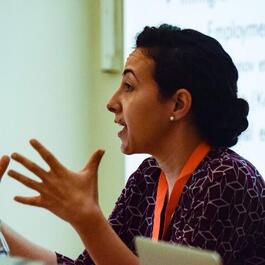
The MIT Press Podcast
Interviews with authors of MIT Press books.
Show episodes

Dagmar Schafer, "Ownership of Knowledge: Beyond Intellectual Property" (MIT Press, 2023)
Ownership of Knowledge: Beyond Intellectual Property (MIT Press, 2023) provides a framework for knowledge ownership that challenges the mechanisms of inequality in modern society. Scholars of science, technology, medicine, and law have all tended to emphasize knowledge as the sum of human understanding, and its ownersh

Sharon Sliwinski, "An Alphabet for Dreamers: How to See the World with Eyes Closed" (MIT Press, 2025)
Borrowing from the traditional alphabet book genre for children, An Alphabet for Dreamers: How to See the World with Eyes Closed (MIT Press, 2025) by Dr. Sharon Sliwinski provides adult readers with a new grammar for dreams, or what neuroscientist Sidarta Ribeiro calls “oracles of the night.” In this book, Dr. Sliwinsk
An analysis of advances in military technology that illustrates the importance of organizational flexibility in both an attacker’s innovations and an opponent’s adaptations.How important is military innovation in determining outcomes during armed conflict? In Innovation and Adaptation in War, Matthew Tattar questions t

Thomas Princen, "Fire and Flood: Extreme Events and Social Change Past, Present, Future" (MIT Press, 2025)
Thomas Princen explores issues of social and ecological sustainability at the School of Natural Resources and Environment at the University of Michigan. He works on principles for sustainability, overconsumption, the language and ethics of resource use, and the transition out of fossil fuels. His latest book is Fire a

Joanna Merwood-Salisbury, "Barbarian Architecture: Thorstein Veblen’s Chicago" (MIT Press, 2024)
An important critic of modern culture, American economist Thorstein Veblen is best known for the concept of “conspicuous consumption,” the ostentatious display of goods in the service of social status. In the field of architectural history, scholars have employed Veblen in support of a wide range of arguments about mod

Christopher Ali, "Farm Fresh Broadband: The Politics of Rural Connectivity" (MIT, 2021)
As much of daily life migrates online, broadband—high-speed internet connectivity—has become a necessity. The widespread lack of broadband in rural America has created a stark urban–rural digital divide. In Farm Fresh Broadband: The Politics of Rural Connectivity (MIT Press, 2021), Dr. Christopher Ali analyzes the prom




